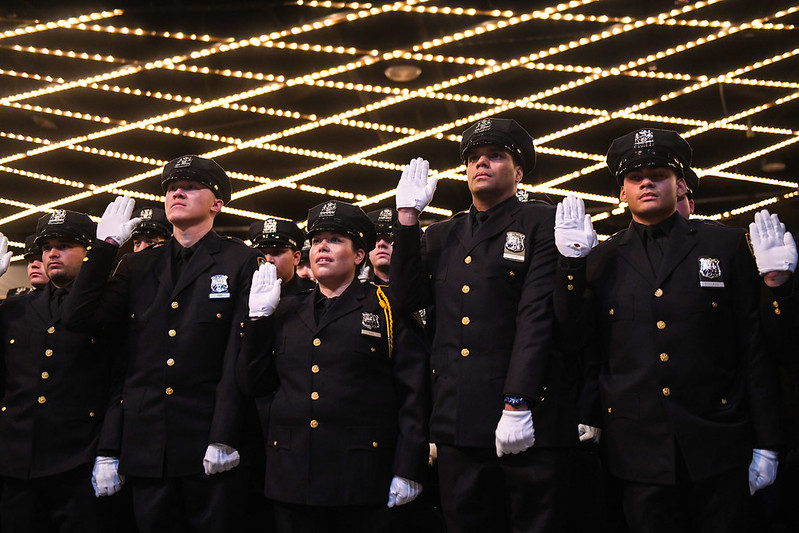
NYPD officers (photo: Michael Appleton/Mayoral Photography)
This guest column is part of Citizens Union Speakers, a regular series of op-eds written by members of the Citizens Union Foundation community in Gotham Gazette, CUF's flagship public education program. The opinions expressed in these Citizens Union Speakers columns are those of the authors alone, not Citizens Union Foundation, Gotham Gazette, or any other entity.
* * * * * * * * * * * * * * * * * * * *
During its most recent session, the State Legislature enacted and the Governor signed a number of important reforms relating to police misconduct, most notably the repeal of Section 50-a of the Civil Rights Law, which prevented disclosure of any documents relating to the disciplinary records of police officers. Another law, however, which remains in effect, requires disciplinary hearings against police officers to be heard within the police department and thus prohibits such hearings to be conducted before an independent tribunal. The Legislature should amend the law to remove that prohibition.
New York State Unconsolidated Laws Section 891, which dates back to 1940, provides the procedures for the removal of police officers “serving in the competitive class of civil service in any city, county, town or village of the state.” One of its provisions states: “Hearings upon charges pursuant to this act shall be held by the officer or body having the power to remove the person charged with incompetency or misconduct or by a deputy or other employee of such officer or body designated in writing for that purpose.”
Although the statute deals with procedures for the removal of a police officer, one appellate court has ruled that it prohibits any disciplinary proceeding from being heard outside of the police department, whether or not the penalty of termination is sought or is a possible outcome of the process. See Lynch v. Giuliani, 301 A.D.2d 351, 356-57 (1st Dept. 2003). The history of that case is instructive.
In 2001, during the last year of the Giuliani administration, the New York Police Department entered into a Memorandum of Understanding with the Civilian Complaint Review Board whereby the CCRB was delegated exclusive authority to prosecute cases in which it had substantiated the charges and specifications. The MOU also provided that hearings on those matters would take place before the Office of Administrative Tribunals and Hearings rather than within the NYPD. The Police Benevolent Association, led by Patrick Lynch, sued to challenge the validity of the MOU with its primary focus on the delegation of the prosecutorial function to the CCRB; however, the lawsuit also challenged the transfer of hearings to OATH.
The lower court upheld both provisions but modified the latter, holding that because of Section 891, any case in which termination was a possibility had to be heard within the NYPD. The Appellate Division affirmed the holding that delegation of prosecutorial authority to the CCRB was lawful, but reversed with regard to hearings before OATH, ruling that all such matters must be heard within the NYPD whether or not termination was a possible outcome of the disciplinary process. Neither party appealed.
As a result, all disciplinary proceedings against police officers continue to be heard within the NYPD before administrative hearing officers who are appointed by the Police Commissioner and serve at the commissioner’s pleasure. This is in contrast to all other New York City agencies for which disciplinary cases against employees (including uniformed employees) are heard before OATH judges who serve for fixed terms and are not answerable to the agency head whose employees are the subject of the hearing. Thus, the officials within the NYPD who hear and make recommendations with respect to disciplinary cases against police officers lack the independence and job security of the administrative law judges within OATH who hear and decide such matters in disciplinary cases involving all other city employees.
This is not to suggest that the NYPD administrative hearings officers are not persons of quality. Some are outstanding. Most notably, Rosemary Maldonado, the Deputy Commissioner of Trials, conducted a fair and dignified hearing of the case of Daniel Pantaleo, the police officer whose chokehold resulted in the death of Eric Garner, and issued a thorough and balanced report that recommended his termination. However, the proper handling of one high-profile disciplinary proceeding does not obviate the structural flaw in the system. Public confidence in the disciplinary process would be enhanced if the disciplinary hearings for police officers, like those for all other city employees, were conducted before the independent administrative law judges of OATH rather than within the NYPD.
In order to achieve that result, the State Legislature should amend Section 891 to remove the sentence requiring police disciplinary hearings to be conducted within the police department.
***
Frederick P. Schaffer is a Director of Citizens Union Foundation.
This guest column is part of Citizens Union Speakers, a regular series of op-eds written by members of the Citizens Union Foundation community in Gotham Gazette, CUF's flagship public education program. The opinions expressed in these Citizens Union Speakers columns are those of the authors alone, not Citizens Union Foundation, Gotham Gazette, or any other entity.
* * * * * * * * * * * * * * * * * * * *




